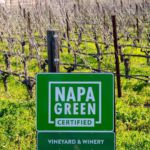This week in Napa Valley the RISE climate and wine symposium series kicked off, featuring headline speaker, Jancis Robinson, MW. Known as one of the world’s greatest wine writers and trend predictors, Robinson spoke for an hour on what the global wine industry could do to mitigate climate change. Her presentation highlighted a number of key wine trends starting to emerge now and in the future that impact climate change and consumer taste.

Jancis Robinson, MW, featured speaker at Napa RISE
THACH
6 Wine Trends Impacting Climate Change And Consumer Taste
- FORBES | Liz Thach, MW |
- April 7, 2023
Trend #1 – More Light-Weight Wine Bottles
With the glass bottle making up 50% to 68% of wine’s carbon footprint, Robinson predicted that more wineries will be reducing the weight of their wine bottles. The high carbon footprint is attributed to wine glass production and transportation. Heavy glass bottles also take a toll on employees working in wineries and wine shops who often lift multiple cases of wine per day.
“The goal by the SAQ in Quebec is to reduce the weight of glass wine bottles to 420 grams,” stated Robinson. Today many wineries use wine bottles ranging from 700 to 900 grams.
There are already a handful of wineries who are embracing the ‘light-weighting’ trend and saving millions of dollars. Craggy Range in New Zealand, Spottswoode and Grgich Hills in Napa Valley, Kendall-Jackson in Sonoma, Native Flora in Oregon, and Albert-Bichot in Burgundy are justjust a few of the wineries who have already embraced this trend.
“By reducing its bottle weight, Tablas Creek achieved $2.2 million in savings over 14 years,” announced Robinson.
Trend #2 – The Growing Use of Alternative Wine Containers
Robinson commented that she is not against glass bottles, because they are the best way to age and cellar a fine wine, but since more than “80% of wine is consumed within a few days of purchase,” that alternative wine containers will be adopted by more wineries.
Her comment is supported by revenue and volume growth for wine sold in cans, boxes, and tetra (carton). According to NielsenIQ, Tetra packs grew 5.1% in sales and 3.7% in volume in the U.S. in 2022. Straights Research predicts cans to achieve a CAGR of 13% from 2022 to 2030, and global boxed wine is expected to grow at CAGR of 5.1% from 2022 to 2032, according to Future Market Insights.
“The big issue, however, is recycling” stated Robinson. In the U.S., consumers only recycle 50% of aluminum beverage cans and 30% of glass, according to the EPA. “In Europe, the glass recycling rate is around 52%,” Robinson said, “but in certain areas, such as Scandinavia, Switzerland, Germany, the rates are much higher.”
Trend #3 – Fresh, Acid-Driven, Lighter Wines
“Dark colored wine with high alcohol and heavy oak are out of vogue, and acid and freshness are in,” stated Robinson. More and more consumers are seeking fresh, light wines with lighter, more natural colors, she continued. These include zippy sauvignon blancs and other refreshing white wines, as well as lighter colored reds like pinot noir, along with rosé and sparkling.
This trend is also supported by recent NielsenIQ scan data in the U.S. showing that sauvignon blanc was the only wine varietal with increased volume and value sales in 2022.
Trend #4 – Increasing Consumer Interest in Unique Grape Varieties and New Wine Regions
“Indigenous and alternative grape varieties will have their moment,” predicted Robinson. She mentioned that many consumers, especially younger ones, are interested in trying indigenous grape varieties that have grown naturally for hundreds of years in countries like Portugal, Italy, Greece, Georgia, and others.
Likewise, there is a rise in attraction to new wine regions, specifically smaller appellations (sub AVAs in the U.S.) and special vineyards. Robinson calls this “geographical specificity,” which alludes to a desire to understand the climate and culture in special vineyards around the world.
Trend #5 – An Increase in Disease Resistant Grape Varieties
Due to climate change, Robinson predicted that more wine regions will seek out disease resistant grape varieties to plant in their vineyards. These may include varieties that can better with stand drought and floods, as well as new hybrid grapes that can adapt better to climate change.
Regions, such as Bordeaux, have already approved heartier grape varieties to battle climate change: Arinarnoa, Castets, Marselan, Touriga Nacional, Alvarinho and Liliorila. Robinson mentioned that Cloudy Bay Winery in New Zealand is considering using a different strain of sauvignon blanc in the future to help mitigate against climate change.
Related to this is the higher adoption of drought and disease resistant vineyard rootstock by wineries in the future.
Trend #6 – Red Wine Is No Longer King and Fruit Can Be Added to Wine
Robinson concluded her presentation by mentioning that after years of dominating wine sales, “red wine is no longer king.” There is a resurgence of white wine drinking, especially in Europe, and there is now a shortage of chardonnay in wine regions from Oregon to New Zealand.
Adding fruit and other flavors to wine is also starting to become in vogue, harkening back to the old days of wine cocktails – many of which were invented in Europe. This trend is also supported by recent NielsenIQ data showing that wine cocktails, especially in Ready to Drink (RTD) containers, have surged in sales.
About the Napa RISE Wine & Climate Symposium
This is the second year that the Napa RISE symposium has been hosted in Napa Valley at Charles Krug winery. Its mission revolves around setting a standard for sustainability and climate action to galvanize the global wine industry. Co-founders are Anna Brittain and Martin Reyes, MW.
Napa RISE has organized the series of six symposium seminars around the Six Pillars of Sustainable Winegrowing Leadership:
· ENERGY EFFICIENCY & SAVINGS
· WATER EFFICIENCY & SAVINGS
· WASTE PREVENTION & SUPPLY CHAIN
· PROACTIVEIVE FARMING, SOIL HEALTH & BIODIVERSITY
· SOCIAL JUSTICE, DIVERSITY & INCLUSION
· CLIMATE ACTION & REGENERATIVE AGRICULTURE
Follow me on Twitter or LinkedIn. Check out my website or some of my other work here.
I am a Professor, Wine Writer and Consultant based in Napa and Sonoma, California. As an award-winning author and educator, I specialize in wine business strategy, marketing, leadership/executive development, and wine lifestyle. My passion is wine, and I have visited most of the major wine regions of the world and more than 65 countries. I teach part-time in the Wine MBA program at Sonoma State University, and also teach a wine business class for Stanford Continuing Education. My publications number over 200 articles and 9 books, including Call of the Vine, Best Practices in Global Wine Tourism and Luxury Wine Marketing. I completed my Ph.D. at Texas A&M University in Human Resources, and became a Master of Wine (MW) in May 2011, after passing the most rigorous wine exam in the world. In my free time, I enjoy hiking, golf, reading, and wine dinners with family and friends, as well as serving on several non-profit wine boards and being a wine judge.
Making the commitment to third party certification takes time and effort, but it is worth it to demonstrate our commitment to the community and to protect our watershed, our land and the air we breathe.
- Susan Boswell, Chateau Boswell Winery



